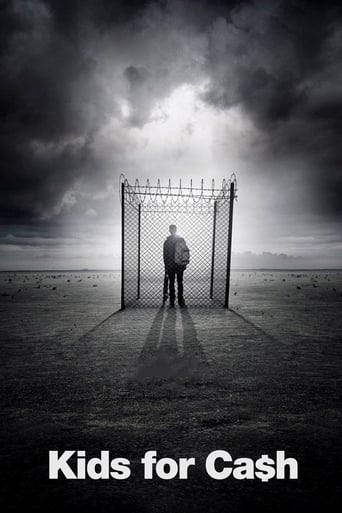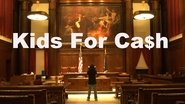Tss5078
It is one of the most disturbing stories of just how greedy and corrupt people can truly be. In 2000, Luzerne County Pennsylvania needed a new Juvenile detention facility, but couldn't afford it, so they privatized it. Leading the group that won the contract, were two of their own Juvenile court judges. That alone was a grey area, but not the issue. Soon, the judges learned that the more occupants the jail had, the more money the facility would receive from the state. So, despite the law, which requires juvenile offenders to be sentenced to the least restrictive environment possible, kids as young as thirteen, with no previous record, were being sent to JV for very minor offenses. As a result, the facility was receiving millions from the states, which the judges were embezzling. As the scandal unfolded, this documentary was filmed and shockingly, both judges agreed to be a part of it, claiming they were always tough on juvenile crime and had done nothing wrong. Judges never comment on cases and defendants are always advised not to talk to the media, but for some reason these judges did, and the way they justify their actions is truly sickening. There is even one scene where a mother confronts one of the judges outside of court house, holding a picture. She says to him, this is my son, he was fifteen when you put him in jail for drinking some beers and fighting with other teens. He served three years and within six months of being released he killed himself, and that's your fault. The judge could care less, it was truly amazing. The documentary is an eye opener and it follows the scandal through the family and offenders stories, through the investigation, right up through the trial and outcome, it really something to see. The whole thing really makes me wonder, if judges can be swayed that easily, just how corrupt is this country and how many truly innocent people are there sitting in jail or on a list somewhere, all because someone was paid to put them there?
Michael Radny
Kids for Cash is a documentary that shows the horrific miss sentencing of several young American kids as a ploy for the judges receiving cash in hand by sending these kids to private detention centres. Throughout the documentary you can't help but feel for these kids who have had upwards of seven years of their life thrown away due to greed and selfishness of the authority figures. Though the documentary travels on both sides of the fence (between the judges fault and not the judges fault) the bulk of the film views the head judge as this overly conservative man who has only his own interests in hand. One great documentary and never gets boring. Though the documentary will polarise views of the situation, anyone who is interested in this case will be glad they had watched this gem.
Walt-Most
This is a beautifully made film about the huge judicial scandal that became known as "kids for cash." Basically, two judges in Pennsylvania secretly received millions of dollars from the owners of a for-profit prison for juveniles in their jurisdiction, while at the same time pulling strings to give the prison a monopoly on juvenile detentions and (in the case of one of the judges) sentencing hundreds (literally, hundreds) of juveniles to years of incarceration in the same prison, without due process and often for truly minor misbehavior.The documentary tells its story through interviews, news footage, and a limited number of title cards. There is no narrator, and the voice(s) of the interviewer(s) are not heard. The focus is on five of the hundreds of teenagers who were imprisoned in this scam: Charlie Balasavage, Justin Bodnar, Hillary Transue, Edward Kenzakoski, and Amanda Lorah. The interviews with the victims are heartbreaking. We also hear from the two judges (Ciavarella and Conahan), who allowed themselves to be interviewed for the film while the federal cases against them were pending. In some ways, this footage, while infuriating to watch, was the most interesting aspect of the film. Among the other interviewees are Terrie Morgan, the reporter who mainly covered the scandal for the Wilkes-Barre Times Leader (and who serves as a de facto narrator), and Marsha Levick and Robert Schwartz, two attorneys with the non-profit Juvenile Law Center who worked to have the cases affected by the scandal vacated.The events covered here present dangerously rich material for a filmmaker. Should the story be about money? About power? About the juvenile justice system in general? The one weakness of the film is that it moves around among all of these themes without clearly digging into any of them. The opening and closing title sequences suggest that the third, broadest theme is the focus. But if so, why use the damage caused by two judges who were clearly corrupt as the vehicle?Despite that flaw, the film deserves 8 stars for its excellent production values and, most of all, the powerful interview footage, which brings home the effects the scam has had on so many lives.
David Ferguson
Greetings again from the darkness. Focusing on "the honorable" Judge Ciavarelli and Judge Conahan of Pennsylvania, director Robert May (The War Tapes) provides some insight into a despicable miscarriage of justice that the media labeled Kids for Cash. It's a catchy phrase that can be defined as a convergence of some less-than-favorable traits: abuse of power, over-the-top greed, and a collapse of trust in the juvenile justice system.The talking head approach is on full display, and proves quite effective here. We get interviews and statements from attorneys, journalists, citizens, a particularly vocal radio talk show, and surprisingly, even Judge Ciavarelli and Judge Conahan. The biggest wallop comes from the words and body language of those most directly impacted – the kids and their parents.For those unfamiliar with the story, Ciavarelli and Conahan were charged in various felonies related to their conspiratorial actions that led to the closing of a County facility, the fundraising for a new private facility, and the subsequent sentencing of thousands of kids to ensure the facility remained at capacity. The financial rewards for these two men included "finder's fees" ($2 million for Ciavarelli), or what most others would term bribes or kickbacks.The actions of Judge Ciavarelli are defended by his staunch campaign strategy of "Zero Tolerance" in the wake of the Columbine tragedy. Once elected, his frequent speeches at local schools reinforced his commitment to zero tolerance, and his promise to severely penalize any kid that ran afoul of the law. In theory, most of this sounds like a formidable stance, however, the real problem occurs when the test of reasonableness is absent in the charging of teenagers with a crime. This is where the film falls a bit short. The kids going to court makes a dramatic story, but the missing link is HOW does this happen when most of these cases come across as schoolyard dust-ups, typical teenager antics (a MySpace page), and simply part of the maturing process for adolescents? There is an acknowledgment that most young teenagers don't have the necessary decision-making skills or sense of judgment to handle these situations. The point is well made that teenagers are not just little adults … there is much growth to come, both physically and intellectually. This leads to the real question: why aren't we doing a better job of allowing kids to develop their judgment and dispute resolution skills. The pizza shop guy in the movie says "we all got in playground fights". He's right! But these days, that gets the kid (even first time offenders) arrested and possibly sent away … where they come back hardened and angry. This approach is not working - though, I'm certainly not suggesting mass playground fights. There has to be a better way.With so much attention to the (then) upcoming trials of the two judges, the film's tone shifts to one of revenge and reckoning. It's an emotional and powerful time, and neither of the judges come across as believable or likable. In fact, Conahan strikes a plea bargain, and Ciavarelli defiantly states he is not guilty of "kids for cash" … AFTER being found guilty of 12 felonies on related issues! His true character shines through.The film expertly tells the story … often very personal stories … of some of those impacted by the Kids for Cash scandal. It raises many questions on numerous topics, though most are overshadowed by the focus on the judges' trials. Near the end, many statistics are displayed – some of which could support their own documentary. The real impact of a documentary is judged by its call to action – the ability to get people involved in finding answers and solutions. Let's hope the impact is profound, even if it's too late for some.


